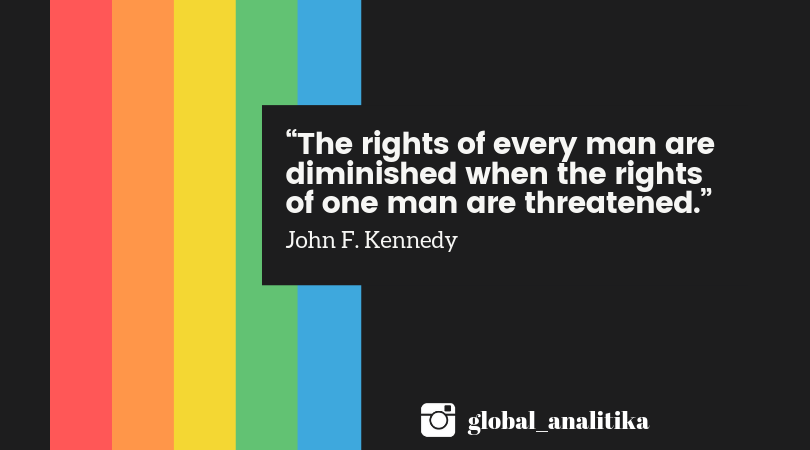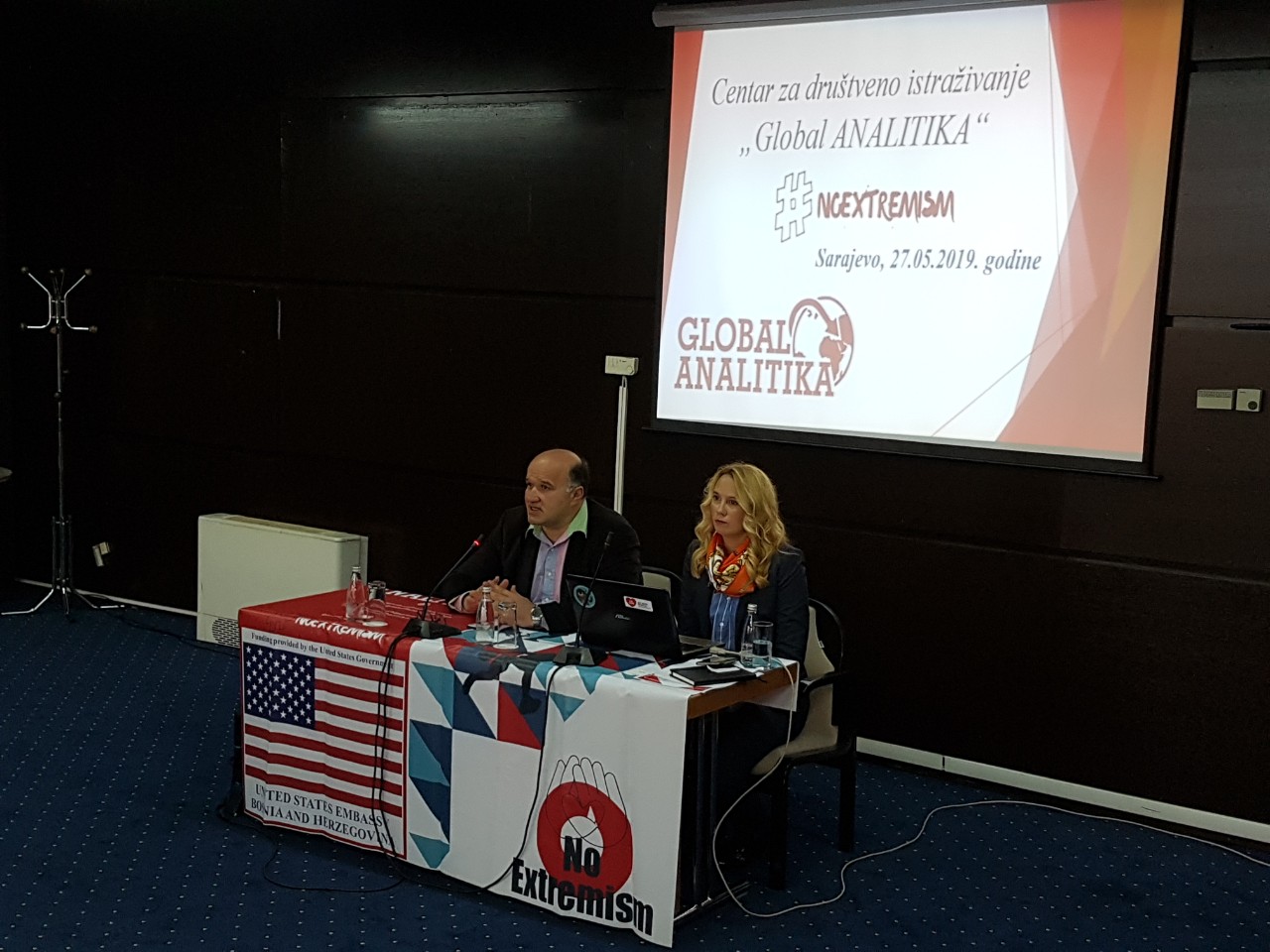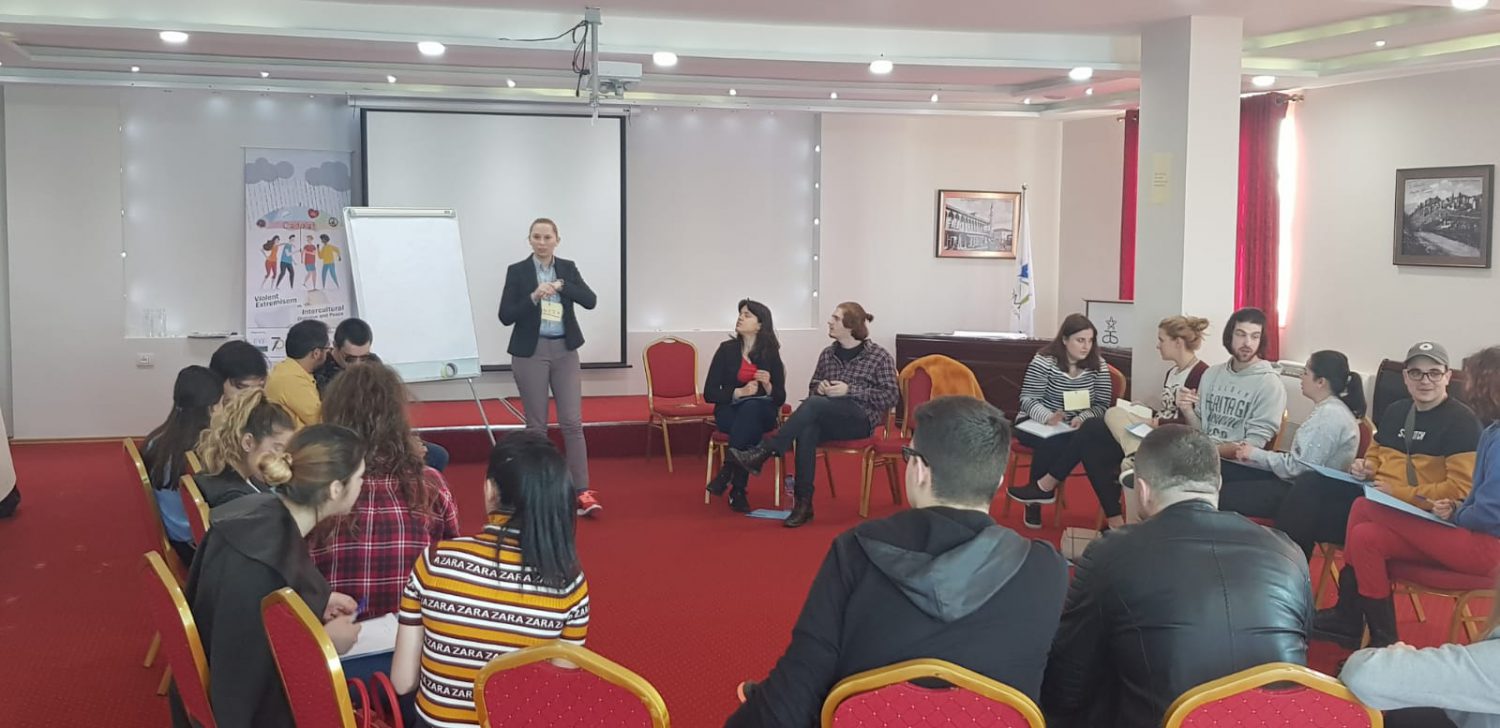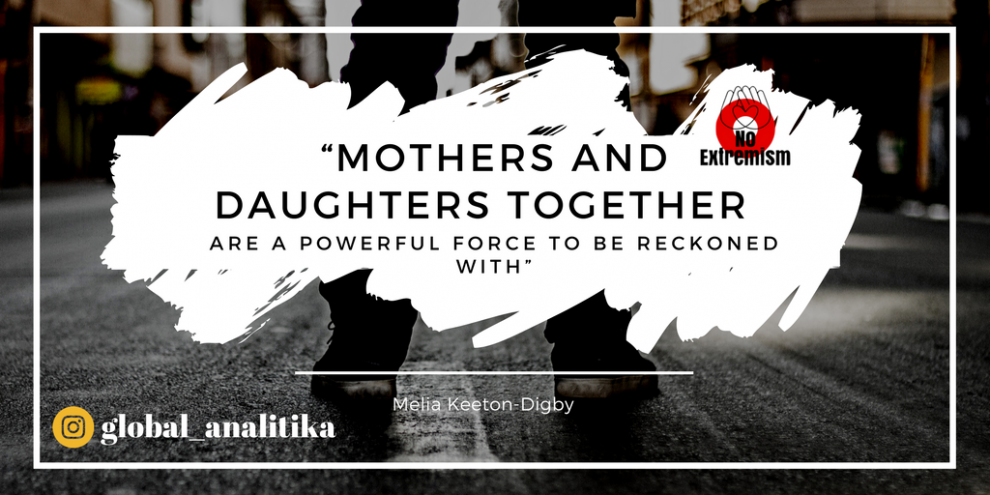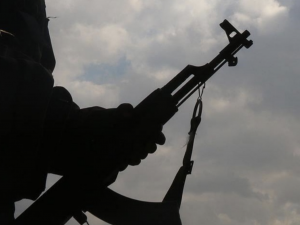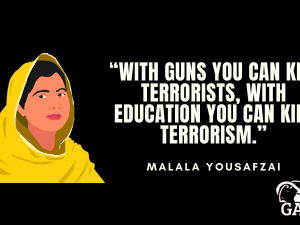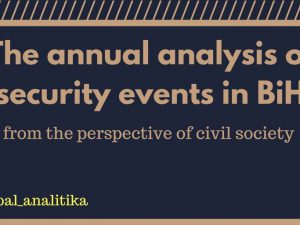In 2005, Clinton Eastwood stated for the “Time Magazine”: “Extremism is so easy – You’ve got your position, and that’s it- it doesn’t take much thought”. Today, the concept of violent extremism is often mentioned, but many are not sure what this concept relates to, exactly. Violent extremism encompasses beliefs and activities of people who support and use violence to achieve ideological, religious and political goals. All kinds of violent extremism want to stimulate changes by applying fear and intimidation. Ideological violence, for example, misuses religious postulates which are being interpreted in the most extreme ways and serve as justification for violence. Ethno-nationalistic or separatist violence is being used to fight for political goals or independence based on race, culture and ethnicity (Australian government n.d.). This topic is multilayered, complex and relevant in almost every part of the world. When analyzing the role of women in violent extremism, Eastwood’s statement about assigning positions can resonate to a significant extent and is valuable in research and reflection. It also stimulates contemplation about imposing and voluntary selection of such roles.
Security is often linked to men and their sphere of influence, which is largely due to their traditional position in the family. This dichotomy (public-male) and (private-female), where the public sphere represents the main source of power, encourages discourse of man having a monopoly on power. In this context, women condemned to the private sphere remain permanently power deprived. Such views were reflected in the literature of security studies: perceiving the woman as a victim of the conflict. Women in violent extremism are usually perceived as victims of sexual violence. It is true that many organizations with radical views carry out sexual violence over women who are Kurdish, Christian and Shiite minorities (Khelghat-Doost 2017). The so-called Islamic state uses sexual violence against women to create an image of toughness and strength. Boko Haram uses rape as a political tool against Christian women in Nigeria. There are also theories that represent women in such organizations as objects solely for the needs of male combatants. According to some resources, the famous phrase “bride” for terrorist fighters relates to women who decided to start a radical political campaign against women in the West. Independent wrote about research conducted in the UK, Canada, France, Germany, and the Netherlands by Royal United Services Institute for Defence and Security Studies (RUSI). Some of the findings that surfaced after interviewing people who worked in de-radicalization programs were indicating voluntarily moment in decisions of women to join the so-called Islamic state. These women contended that joining Islamic state was necessary because they felt rejected by their society. Social exclusion has reached the pinnacle in the countries that ban wearing burqas, such as Netherlands and France. In these countries, for instance, women felt unable to express their religious affiliation in the way they wanted. Researchers found a connection between radicalization of these women and Islamophobic attacks directed against them, economic disadvantage and perception of their unsuccessful integration into the society. Often, these women are being mentioned in the context of the victim “lured” through online propaganda which presented them an unrealistic image of the religious war which, in fact, has no connections with religion.
More factors contributing to radicalization and joining violent-extremist organizations were identified. These factors relate to unstable emotional nature of women and their problematic families. An additional evidence of victimization of women in violent-extremist organizations is their position of the object under male control and assessment. In support of this, one can analyze the situation in the so-called caliphate where men attribute social status to women on the basis of their appearance and nationality. In that sense, blonde women of foreign origin are more appreciated. Converting religious affiliation is perceived as “more worthy” and these women are often married to the most respected fighters. Combatants of the so-called Islamic state consider “domestic women” unattractive because of their arrogance. They believe that a woman is made out of the man, for a man, and consequently, she has no greater responsibilities than being a good wife and mother. Girls are expected to marry at age sixteen while they are still young, clean and attractive. The woman’s obligation is to win the male’s heart and to be a source of consolation to the fighter during a battle in the Holy War (Spencer 2016). Brutality against women escalates when it is estimated that the Sharia law is violated. Then, punishment such as stoning, lashing, and killing is a logical sequence of events. It happens that brides for the combatants try to escape as was the case with an Austrian teenager from Bosnia and Herzegovina, Samra Kešinović, who was beaten to death due to attempted escape (Dearden 2017).
While a significant number of women are indeed victims of violent-extremist organizations and are mainly in the role of wives and mothers, some women act as protagonists and their participation in violent extremism is growing rapidly. However, such a growing trend is often underestimated. Women were actively involved in violent groups through history and through numerous contexts, starting with the murder of Tsar Alexandre II, suicide bombers or the Black Widows of Chechnya to the Liberation Tigers of Tamil Eelam (Spencer 2016). The Black Widows of Chechnya is the term used for women terrorists who have lost husbands, brothers or other blood relatives in one of the two war fights between Russia and Islamic rebels since 1994. Motivated by the grief, these women seek revenge through suicidal terrorist activities. In the last 12 years, 46 women became terrorists and carried out 26 terrorist attacks. Black widows are considered as women who have nothing to lose. For them, suicide missions are not so much connected to religion, although it is clear to them that the return of Islam to Chechnya is a very important element in building the identity of a torn region. Ban to practice their religion will be interpreted as a personal attack (Jamali, 2017). Furthermore, the original role of women in the Irish Republican Army was reflected in the transfer and concealment of weapons. Later on, the ideological loyalty to the Republic of Ireland and fight against British rule was stronger and more important than focusing on gender roles (Global Connections n.d.). Consequently, Irish Republican Army had women as conventional perpetrators of terroristic acts. Women enthusiastically joined extremist groups, struggled for what they believed and paid the price of such behavior in a similar way as their male counterparts. According to Spencer, the relevant literature did not identify women as the main players of terrorist organizations until the ’70s and ’80s when they started to have prominent roles in guerrilla wars in Latin America. Revolutionary movements that were happening in Latin America during the last century have promoted goals such as defeating dictatorships, countering economic inequalities, and creating a “new man,” as Cuban revolutionary “Che” Guevara conceived it. The term “new man” did not include only men given the fact that women were joining the revolutionary movements in Nicaragua and El Salvador, becoming guerrillas and “fleeing” from their traditional roles (Kampwirth n.d.). Consequently, the rapid expansion of research on the active role of women in violent extremism has begun. The study was conducted based on fieldwork between 2015 and 2017 in the area of Afghanistan, Iraq, Lebanon and the Syrian border with Turkey. A series of interviews with refugees, officials, social activists, local journalists, and academics were carried out. The data collected from these sources indicate that organizations such as the so-called Islamic State, systematically give space to a number of women to conduct more responsible activities through gender-segregated parallel institutions. Such organizations have succeeded in establishing de facto states (caliphates) in parts of Iraq and Syria, but the latest events show that they have significantly lost this territory. Almost every institution in these de facto states had a section, exclusively intended for women. Gender-segregated parallel institutions included education, health, police, army, and finance. These departments were managed by women and their communication with male colleagues was minimal.
Mahmoud, the refugee from Iraq, claimed that even kindergartens are separated on male and female and that women employed there receive a salary from the so-called Islamic state. According to Mahmoud’s claims, children are being educated by prescription, focusing on the cultivation of the right worldview in girls and supporting them to be devoted future wives to terrorist fighters and mothers to their children. Particularly interesting is the role of women in the police and the activities conducted by the formation named “Al-Khansaa Brigade”, where women patrol through the cities of Raqqa and Mosul and check whether other women comply with strict Islamic rule. Al-Khansaa members are full rulers of “women’s affairs” in the territory of the so-called Islamic state. They often visit women’s schools and hospitals and observe the extent to which pupils, teachers, doctors and nurses obey the sharia law. Osama, a refugee from Syria, recounted the case of her relative, who was arrested by Al-Khansaa for being inappropriately dressed. Women who questioned her were not from Syria and used insulting, hitting and forcing as questioning methods. The brutality of the Al Khansaa Brigade is illustrated the best through the example of punishing women for not wearing niqab by pouring acid on their face (Gilsinan 2014).
The example of Al-Khansaa also shows how women advance the agenda of extremist organizations. Women’s engagement has now become the strategic technique of the so-called Islamic state, where they are being prepared for the role of combatants. Women, generally, go through courses in five different disciplines: 1) first aid 2) social networks, marketing and programming 3) sharia law 4) firearms 5) household jobs. According to the survey where participants were 72 women from the so-called Islamic state, women have multiple roles. However, the percentages are dominantly on the side of the role of recruiters and role of a combatant’s wife. Still, notable is a percentage of “roles” that are not traditional, like prison guards and police officers. Although the so-called Islamic state treats women brutally, they paradoxically represent irreplaceable part of the whole organization. Their importance is especially reflected in expanding global influence on new members through online recruiting. Via the internet, a false image of women empowerment and harmonious family life is being shown extensively. It is very unusual that women are the key actors of these deceptions. Weaver states that women from Britain are prominent online recruiters and PR experts for the so-called Islamic state. The most famous is Sally Jones, commonly known as “White Widow”. Under the influence of her husband, Sally changed religious affiliation and went to Syria where she enjoyed very good social status. She was exceptionally successful in the role of recruiter and more than a hundred women were recruited by her influence. She used a pseudonym on social networks to provide detailed instructions on what women should do to join the so-called Islamic State.
“We are created to be mothers and wives – regardless of the extent to which West distorted your attitudes”- contended Sally on her profile while trying to obtain new members. It is believed that Sally was killed in an American air strike. Even today, she represents a recruiting icon. “White Widow” is an illustrative example of the power of violent-extremist organizations that can reach all parts of the world via internet and position women, the former punk rocker of white skin and blond hair to a very prominent place within their organization.
This specific insight into the topic showed that the role of women in violent extremism is not limited to fulfilling obligations of wives and mothers and that joining extremist groups is not solely imposed on women. It is important to emphasize a brutal attitude towards women in such organizations which are often “lured” by professional online PR techniques which promote women’s empowerment and a better life. Recruiting through social media is essential because of its powerful reach and impact on people in general. Women dissatisfied with their position in society with problematic family backgrounds are targeted and are vulnerable as well. In one respect, online recruitment of women can be compared with deception where women are the key factors behind it.
However, it is important to mention studies suggesting pure freedom of choice in this context. The specificity of women joining the so-called Islamic state is reflected in the fact that availability of the Internet and all advantages it offers was, for the first time, fully exploited for radicalization purposes. Internet significantly accelerated the process of obtaining potential women combatants who were ready to go to Syria and Iraq. This specific example shows how powerful and dangerous internet can be.
The topic of extremism is, generally, approached from the Western point of view with a set of values on which Western society was built. Even when one presents examples of the role of a woman as a police officer or a police guard, society has high tendency to characterize it as a pure example of exploitation of women and their enslavement dictated by men in a position to “assign” these roles. The aspect of true ideological dedication and the need for a type of rebellion that resonates with the values of other societies is often ignored.
Women in extremist organizations is a very complex topic and attention needs to be paid in order to avoid the trap of stating that women in violent extremism are only victims and have no great powers and free will, just because their situation does not resonate with Western ideas of what freedom and power represent. Examples from the so-called Islamic State, where women are engaged as PR experts for recruiting young women by offering them something that does not resonate with the reality, do not fit completely with the discourse of victim, which is emphasized the most. Inhumane treatment of women is undisputable, where their existence is tightly connected to the needs of combatants. However, some women feel empowered in the so-called Islamic state. Through the police, they apply force and violence to other women. It is difficult to give a precise answer whether women are victims or perpetrators in violent-extremist organizations. A holistic approach is needed in analyzing multilayered topics like this because by Western standards any role of women in these organizations is more “assigned” then chosen. Just a holistic approach can provide objective answers that each individual has to seek and continually evaluate.



